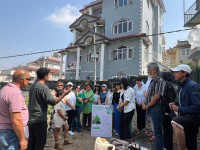Valley
Wordings add to woes of children of single mothers
Prina Tiwari knows the pain of being born to a Nepali woman abandoned by her husband.
Weena Pun
The refusal of chief district officers (CDO) to issue citizenships to children of Nepali mothers, often single, has alienated children like Tiwari. A refugee in their own countries, their options are extremely curtailed.
Tiwari, also an actor in Bhojpuri movies, cannot shoot outside Nepal and India because she cannot apply for a Nepali passport. She wanted to study science for her Bachelor’s degree, but had to choose the field of mass communications because the admission to the latter did not require a citizenship. The job market, once she graduates, looks bleaker.
“The authorities make us feel like we are from another planet,” says Tiwari, tired of running from pillar to post.
The Citizenship Act of 2006 and the Interim Constitution of 2007 allow the child of a Nepali mother or a father to be Nepali by descent. But the provisions are openly flouted by bureaucrats, who keep dismissing appeals from people like Tiwari by saying that the words on the law mean nothing unless there is an order “from the top”.
For 25-year-old Arjun Kumar Sah, the people at the top allowed him to vote in the second Constituent Assembly elections, but still refuse to grant him citizenship. Sah’s mother is Nepali and works as an Auxiliary Nurse Midwife in home district Mahottari, but his father is of Indian origin, which should not have been a problem since his father was born in Nepal and has always resided in the country. But neither his father nor Sah has been able to obtain Nepali citizenship.
“Both my father and I voted in the CA elections because we had birth certificates. But ironically, the same CA refuses to acknowledge our rights,” says Sah, who is currently pursuing an MBA in the Capital. But he thinks his degree and money are wasted.
In a month’s time, he will have to intern at banks and companies here, but no one will hire him for lack of a citizenship card. At one point in the MBA programme, he will have to do a month-long course in countries like Canada and Thailand, but without a passport, that is impossible. Sah has already paid Rs 35,000 to his college for the course. “That money and my degree are both going to be useless,” Sah says in wailing voice.
Maya Lama (name changed) shares a similar fate. She has a Bachelor’s in Management from a college in the Capital, but has had to look for people she knows to get hired. Her mother fell in love with a trekking guide and married him in Solukhumbhu. But soon after the birth of their two daughters, the husband left for Kathmandu and never returned. Before conferring citizenship to Lama, the CDO in Solukhumbhu demands proof that the runaway father was Nepali.
“I can’t even get a sim card in my own name without the citizenship card. You can imagine how tough it is in other areas,” says Lama.
All three of them—Tiwari, Sah and Lama—have met with politicians and appealed them to remove the provision in the new constitution that requires both parents be Nepalis for their child to be Nepali.
Sah has even made it a
mission to meet and talk to every single CA member—he has talked to 232 of them
so far. But like Tiwari and Lama, he has doubts the new constitution will safeguard the right to equality and citizenship.
“Hitting the streets seems to be only option left. Even Madhesi leaders have told us that they would not raise our issues in the CA because they think we didn’t vote for them,” says Sah.




 24.64°C Kathmandu
24.64°C Kathmandu











